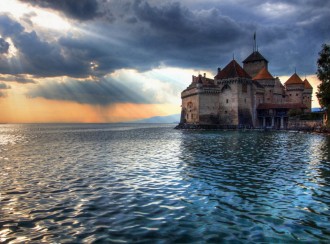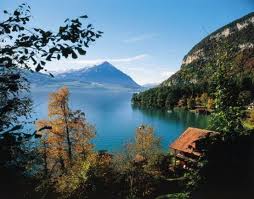Official Language of Switzerland: German, French, and Italian
There are four national languages of Switzerland, which are as follows: German, French, Italian, and Romansh. Only three of these languages, however, maintain equal status as official languages at the national level within the Federal Administration of the Swiss Confederation: German, French, and Italian.
Native speakers number about 64% (4.6 million) for German (mostly Swiss German dialects, though Swiss Standard German is used in writing and in a few official contexts in speaking), 20% (1.5 million) for French (mostly Swiss French, but including some Arpitan dialects), 6.5% (0.5 million) for Italian (mostly Swiss Italian, but including Lombard dialects), and less than 0.5% (35,000) for Romansh.
The German region (Deutschschweiz) is in the north and center, the French part (Romandie) in the west and the Italian area (Svizzera italiana) in the south. There remains a small Romansh-speaking native population in Graubünden in the east. The cantons of Fribourg, Bern and Valais are officially bilingual; Graubünden is officially trilingual.
German:
(Official Language of Switzerland)
Distribution of Highest Alemannic dialects.
The German-speaking part of Switzerland (German: Deutsche Schweiz French: Suisse alémanique Italian: Svizzera tedesca Romansh: Svizra tudestga) comprises about 65 percent of Switzerland (North Western Switzerland, Eastern Switzerland, Central Switzerland, most of the Swiss plateau and the greater part of the Swiss Alps).
In 17 Swiss cantons, German is the only official language (Aargau, Appenzell Ausserrhoden, Appenzell Innerrhoden, Basel Stadt, Basel-Landschaft, Glarus, Lucerne, Nidwalden, Obwalden, Schaffhausen, Schwyz, Solothurn, St. Gallen, Thurgau, Uri, Zug, Zurich).
In the cantons of Bern, Fribourg and Valais, French is co-official; in the trilingual canton of Graubünden, more than half of the population speaks German, while the rest speak Romansh or Italian. In each case, all languages are official languages of the respective canton.
While the French-speaking Swiss prefer to call themselves Romands and their part of the country la Romandie, the German-speaking Swiss used to refer to (and, colloquially, still do) the French-speaking Swiss as "Welsche", and to their area as Welschland, which has the same etymology as the English Welsh (see Walha). In Germany Welsch and Welschland refer to Italy; there, the term is antiquated, rarely used, and somewhat disparaging.
The German-speaking Swiss do not feel very close to their German neighbours to the north (or Austrian neighbours to the east)[citation needed] even though, in the case of Germany, the Alemannic dialects on both sides of the Rhine are similar. The reasons for this are mainly historical, as the German-speaking part of Switzerland has effectively been culturally and politically separated from the rest of the German-speaking areas since the late Middle Ages and officially since the Peace of Westphalia. Another factor is the status of the dialect. Standard German is the official language and is used in writing, and to a great part by the media (the vast majority of newspapers and magazines are written in Standard German), but the spoken language in Switzerland in all social classes is almost exclusively one of the Swiss German dialects.
The German-speaking Swiss do not feel like a uniform group[citation needed]: the average German-speaking Swiss feels foremost belonging to Solothurn, St. Gallen, or Uri, and sees himself not speaking Swiss German, but the Baseldytsch (dialect of Basel), Bärndütsch (dialect of Bern) or Züridütsch (dialect of Zurich)[citation needed]. The marked subsidiarity of the Swiss federalism, where many political decisions are taken at municipal or cantonal level, supports this attitude.
By the Middle Ages there had developed a marked difference between the rural cantons of the German-speaking part of Switzerland and the city cantons, divided by views about trade and commerce. After the Reformation, all cantons were either Catholic or Protestant and the denominational influences on culture added to the differences. Even today, where all cantons are somewhat denominationally mixed, the different historical denominations can be seen in the mountain villages, where Roman Catholic Central Switzerland abounds with chapels and statues of saints, and the farm houses in the very similar landscape of the Protestant Bernese Oberland show Bible verses carved on the housefronts instead.
French:
(Official Language of Switzerland)
Romandy is the French-speaking part of Switzerland. It covers the area of the cantons of Geneva, Vaud, Neuchâtel, and Jura as well as the French-speaking parts of the cantons of Bern (German-speaking majority), Valais (French-speaking majority), and Fribourg (French-speaking majority). 1.9 million people (or 24.4% of the Swiss population) live in Romandy.
Standard Swiss French and the French of France are the same language, with some differences. For example, like some other regions of the French-speaking world, Swiss people (as well as most Francophone Belgians) use septante (seventy) instead of soixante-dix (literally, "sixty ten") and nonante (ninety) instead of "quatre-vingt-dix" ("four twenties and ten"). In the cantons of Vaud, Valais and Fribourg, speakers use huitante (eighty) instead of the Standard French "quatre-vingts" (four twenties). "Sou" is used throughout Romandy for a 5-centime coin, as is "tune" (or "thune") when referring to a 5-Swiss-franc piece.
Historically, the vernacular language used by inhabitants of most parts of Romandy was Franco-Provençal. Franco-Provençal (also called Arpitan) is a language sometimes considered to be halfway between the langue d'oïl (the historical language of northern France and ancestor of French) and Occitan (the langue d'oc, spoken in southern France). Standard French and Franco-Provençal/Arpitan, linguistically, are distinct and mutual intelligibility is limited. Increasingly, Franco-Provençal/Arpitan is used only by members of the older generations.
The term Romandy does not formally exist in the political system, but is used to distinguish and unify the French-speaking population of Switzerland. The television channel Télévision Suisse Romande (TSR) serves the Romande community across Switzerland, is syndicated to TV5, and CanalSat Romande on October 2.
Italian:
(Official Language of Switzerland)
A map showing the Italian-speaking areas of Switzerland: darker areas indicate where Italian is most prominent.
Italian Switzerland (Italian: Svizzera italiana, Romansh: Svizra taliana, French: Suisse italienne, German: italienische Schweiz) is the Italian-speaking part of Switzerland, which includes the Canton of Ticino and the southern part of Graubünden. Italian is also spoken in the Gondo Valley (leading to the Simplon Pass, on the southern part of the watershed) in Valais.
The linguistic region covers an area approximately 3,500 km² and has a total population of around 350,000 inhabitants,[9] with the number of Italophones residing in Switzerland being 470,000.
The percentage of Italian-speaking Swiss has been rapidly decreasing since the 1970s, after reaching an all-time record of 12 percent of the population during the same decade; however this is entirely because of the reduced number of immigrants from Italy in the country: the percentage of native Italian-speaking Swiss has been steady at 4 percent since the 1950s.
Refer to: http://en.wikipedia.org/wiki/Languages_of_Switzerland
Edited by Kevin from Xiamen Romandy Art Limited.
(Xiamen Romandy Art is a professional oil paintings supplier from China. If you want to convert your photos into high quality oil paintings, or you want the masterpiece oil painting reproductions, please don's hesitate to contact with us.)
Romandy Art Website: http://www.oilpaintingcentre.com
Email: romandyart@gmail.com
Tags: Official Language of Switzerland: German, French, and Italian. |